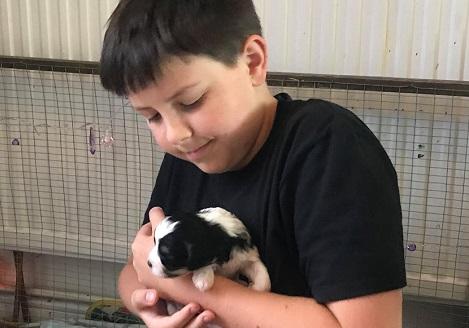
Published on: 26/11/18
Nicola Leyland talks about her son Isaac’s brain injury and the challenging journey that led to her establishing a community for parents ‘Ruffled Unruffled’.

Published on: 26/11/18
Speaking this morning to Annie Othen on BBC Radio Oxford (listen from 9m20s until 27m40s) mum Nicola gave a thorough account of her son Isaac’s journey (similar to that she told in a blog following her initial account of Isaac’s injury).
Eight-year-old Isaac was kicked in the head by a horse in 2013. The radio interview initially talks about his accident, hospital and late diagnosis of a brain injury.
Nicola explains that Isaac’s brain injury went undiagnosed for about 10 months and it was only when a specialist from The Children’s Trust’s Brain Injury Community Service met Isaac that this was diagnosed.
Nicola explains: “Post accident he [Isaac] couldn’t handle anything.”
She continues: “The trauma was like an explosion going off in your family home because nothing was the same again.”
Nicola talks about the lack of support dealing with the trauma of the accident and Isaac’s journey. It is now five years on, Isaac is 13 years old and he has made huge improvements this year alone.
Looking back, mum Nicola feels Isaac returned to school too early after the accident and suffered neuro-fatigue. Nicola went on to independently explore ways she could help her son. One part of her research revealed how much dogs help children with anxiety.
Two dogs, and then their puppies, followed! Nicola says: “It’s about engaging Isaac in life and bringing life into the family home.
“His anxiety gave him agoraphobia, which meant that he found the rest of the world too terrifying. So as much life as I could bring into the house was going to make him feel happier and more joyful.”
Nicola has started a community (a website will follow) called Ruffled Unruffled. This concentrates on dealing with the trauma side of a brain injury.
She explains: “The body responds to trauma and there are ways of helping the body release trauma and there are ways of parenting a traumatised child. They are very gentle, it’s very nurturing and respectful.”
Nicola talks about the ‘whole new world of knowledge about parenting trauma’. She explains how she ‘joined the dots’ after the accident led to so much pressure on Isaac and the family, which in turn created Isaac’s mental health problems.
Nicola’s interview finishes with an update on Isaac’s progress: “Isaac has now improved beyond recognition and he is now capable of learning (only in the past four to five months).
“He is back playing football for his team and doing martial arts. It’s finding all these little things that make all the difference.”